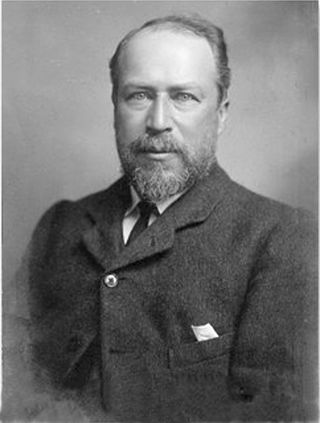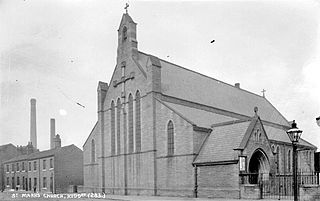
Wycliffe Hall is a Church of England theological college and a permanent private hall of the University of Oxford in the United Kingdom. It is named after the Bible translator and reformer John Wycliffe, who was master of Balliol College, Oxford in the 14th century.

The Dean Cemetery is a historically important Victorian cemetery north of the Dean Village, west of Edinburgh city centre, in Scotland. It lies between Queensferry Road and the Water of Leith, bounded on its east side by Dean Path and on its west by the Dean Gallery. A 20th-century extension lies detached from the main cemetery to the north of Ravelston Terrace. The main cemetery is accessible through the main gate on its east side, through a "grace and favour" access door from the grounds of Dean Gallery and from Ravelston Terrace. The modern extension is only accessible at the junction of Dean Path and Queensferry Road.

St Stephen's House is an Anglican theological college in Oxford, England. From 2003 to 2023 it was a permanent private hall of the University of Oxford.

Trinity College is the oldest residential college of the University of Melbourne, the first university in the colony of Victoria, Australia. The college was opened in 1872 on a site granted to the Church of England by the government of Victoria. In addition to its resident community of 380 students, mostly attending the University of Melbourne, Trinity's programs includes the Trinity College Theological School, an Anglican training college which is a constituent college of the University of Divinity; and the Pathways School which runs Trinity College Foundation Studies and prepares international students for admission to the University of Melbourne and other Australian tertiary institutions, as well as summer and winter schools for young leaders and other short courses.

Herbert Edward Ryle was an English Old Testament scholar and Anglican bishop, successively serving as the Bishop of Exeter, the Bishop of Winchester and the Dean of Westminster.
The Ecclesiastical Household is a part of the Royal Household of the sovereign of the United Kingdom. Reflecting the different constitutions of the churches of England and Scotland, there are separate households in each nation.

Ripon College Cuddesdon is a Church of England theological college in Cuddesdon, a village 5.5 miles (8.9 km) outside Oxford, England. The College trains men and women for ministry in the Church of England: stipendiary, non-stipendiary, local ordained and lay ministry, through a wide range of flexible full-time and part-time programmes.
Church Congress is an annual meeting of members of the Church of England, lay and clerical, to discuss matters religious, moral or social, in which the church is interested. It has no legislative authority, and there is no voting on the questions discussed.

Alfred Barry was the third Bishop of Sydney serving 1884–1889. Over the course of his career, Barry served as headmaster of independent schools, Principal of King's College London university and founded Anglican schools such as Shore School. He officiated at the funeral of Charles Darwin in 1882.

Wesley House was founded as a Methodist theological college in Jesus Lane, Cambridge, England. It opened in 1921 as a place for the education of Methodist ministers and today serves as a gateway to theological scholarship for students and scholars of the Wesleyan and Methodist traditions from around the world. It was a founding member of the Cambridge Theological Federation, an ecumenical body of theological colleges in Cambridge which is affiliated to but independent of the University of Cambridge.

Edward Abbott was an American minister, journalist, and author.

Charles Henry Bromby was the Anglican Bishop of Tasmania from 1864 to 1882.
Leonard Hodgson was an Anglican priest, philosopher, theologian, historian of the early Church and Regius Professor of Divinity at the University of Oxford from 1944 to 1958.

Frederic Henry Chase was a British academic and Bishop of Ely.

Charles Harford Lloyd was an English composer who became a well-known organist in his time.

St Aidan’s College was a Church of England theological college in Birkenhead, Cheshire, England, open from 1847 to 1970.

The former St Mark's Church, Old Leeds Road, Huddersfield, was an Anglican parish church in West Yorkshire, England. It was previously known as St Mark's, Leeds Road, before the road name was changed. This building was designed in 1886 by William Swinden Barber when the parish of St Peter's was split and a new building was required to accommodate a growing congregation. It was opened in 1887. Among the vicars posted in this benefice were the very popular Canon Percy Holbrook, the notoriously unfortunate Reverend Jonas Pilling who was involved in a standoff with his congregation for many years, the sociable Reverend Robert Alfred Humble who died in mysterious circumstances, and the eloquent preacher Reverend Joseph Miller, who had previously been a Congregational minister. The building was sold by the Church of England in 2001, and it has been converted into a block of offices.

Alexander Ross FRIBA LLD was a 19th/20th century Scottish architect specialising in churches, especially for the Free Church of Scotland and the Scottish Episcopal Church. He was Provost of Inverness from 1889 to 1895.















